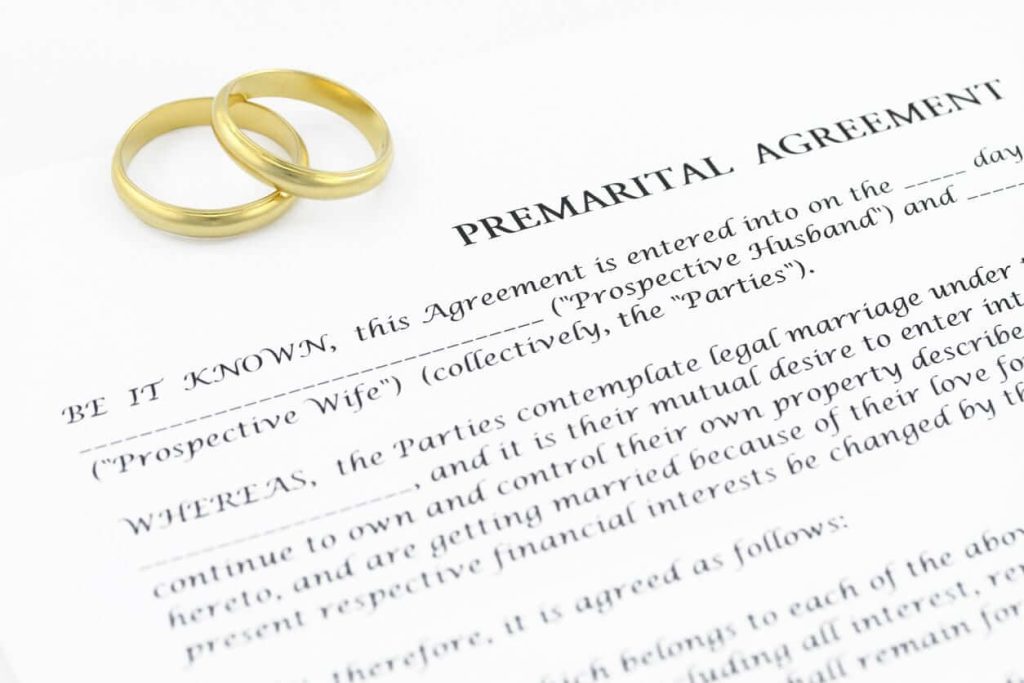At one time a prenuptial agreement was only for the rich and famous. However, more and more couples are deciding to have a prenuptial agreement before tying the knot. Prenups aren’t just for those among us that have an enormous amount of assets to protect. Almost anyone can benefit from some form of prenuptial agreement. Prenups cover a range of issues from alimony to retirement accounts. Given the fact that nearly half of all marriages will end in divorce, it may be wise to consider a prenup.
What is a Prenuptial Agreement?
A prenuptial agreement is a contract between two people that are going to marry each other or enter into a civil union. These agreements are also known as a premarital agreement, a marriage contract, an antenuptial agreement or a prenup for short. The purpose is to settle financial matters in advance of a divorce. While this may seem like a rather unromantic thing to do before marriage, it could prove as a smart financial decision.
Your prenup can cover exactly what you wish. There isn’t a set standard for a prenup that you must use. If you wish to include information about your property or your retirement accounts you can. There are a few things that you can’t include in a prenup; we will discuss those in more detail in the rest of the article.
What Do Prenups Include?
A prenup can include many different provisions depending on the wishes of the couple. These provisions include but are not limited to:
- Alimony: A prenuptial agreement can set guidelines for future alimony payments. It can also dictate that neither spouse will receive alimony.
- Division of Property: A prenup can include provisions for who receives what property. Also, they can spell out how children from a previous marriage will receive part of the property. Lastly, these agreements can include information about what happens to the property if one of the spouses dies.
- Retirement Accounts: One common provision to this type of agreement is what to do with each spouses retirement account. Rather than splitting retirements accounts after a divorce, many couples opt to just keep their own.
- Debt: In a marriage, both parties are usually responsible for any debt. However, a prenup can determine how the couple handles the debt after a divorce. This is especially useful for those individuals whose spouse’s own businesses.
- Division of Household Duties: A prenup can even cover what tasks each spouse should perform. However, it is probably best to leave those sorts of stipulations out of your prenup. Sticking to financial matters is probably the best when to go when drafting your agreement.
- Morality Clauses: Prenups can also include clauses for infidelity. If one spouse cheats on the other, they may lose their rights to part or all of the marital assets. Morality clauses are increasingly more common.
What Can’t a Prenuptial Agreement Cover?
A prenup can’t cover anything illegal. Also, a prenup cannot cover things that go against public policy. For instance, a prenup can not cover child custody. In cases of child custody the court considers what is in the best interest of the child and not a contract between you and your spouse. At the time of the agreement, one spouse may be able to provide a better life for their children. However, things change. What is best for the children at the time of the agreement may not be at the time of the divorce. Therefore, courts do not allow child custody provisions in prenuptial agreements.
Preparing a Prenup
The most important part of preparing a prenup is honesty with your partner. If you want an agreement in place before your marriage, don’t wait until a week before to spring it on them. Discuss the possibility of a prenuptial agreement long before your wedding day. This will help you avoid any resentment or unneeded stress in your relationship. Sit down with your partner and discuss everything you want in the agreement and ask them their thoughts. Be open to compromise, because after all, you hope never to have to use this agreement. Discuss when the prenup should start and how long it should last. Maybe, after 20 years of marriage, you want to eliminate the prenup. While most prenups start on the day of the wedding and last forever, yours could be different.
Gather all of your financial documents including retirement accounts, the property you own, your bank statements, and anything else that the agreement could cover. Sit down with a prenup attorney and hash out the finer details of the agreement. While it may seem like a cold and calculated decision, it could save both of you a lot of time and money in the event of a divorce. Lewert Law can help you decide whether or not a prenup is right for you. Contact us today to learn how they can help.

